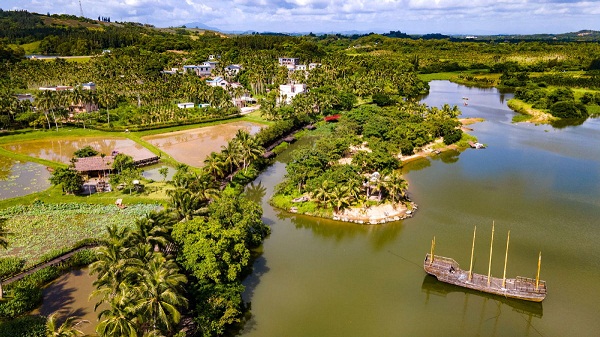
A bird's eye view of Liuke village in Hainan province. [Photo/IC]
HAIKOU -- In the village of Liuke, or "guests stay" in Chinese, houses built with dark bricks and red windows stand quietly amid tall, green coconut trees.
"This is just beautiful," said Zhao Mingzhuo, a tourist from East China's Zhejiang province who is on vacation with his family. "The kids get to enjoy the fields here, the elderly have some quietness, and the young people can experiment camping. It's quite an experience here."
For the National Day holiday, many tourists have come to Liuke Village in South China's Hainan province to admire its natural beauty and abundant culture.
Liuke is one of the ancient villages sitting on the plains of the lower reaches of the iconic Wanquan River in Hainan. Spanning 163 km, the river flows through an area of more than 3,600 square km. A classic Chinese folk song sings in praise of the lucid water of the river, and in recent years the Wanquan River has become a drawcard for Hainan, thanks to the rich stories and history associated with it.
Different from the rapid water currents and mountainous landscape upstream, the lower reaches of the river feature smooth water flows and boundless rice paddy fields. For hundreds of years, locals built villages and townships amid rainforests along the river. Liuke Village is one of them.
In the old days, when villagers needed to travel beyond their villages or outside the province, they had to transfer here. Gradually, the village became a stopover for tourists, hence its name "Liuke."
In recent years, in answer to the country's rural revitalization drive, authorities have made efforts to attract tourists to the village with sight-seeing and entertainment programs.
For instance, villagers and tourists can admire the beauty of the Wanquan River along a 1.2-km-long "landscape belt." To attract young people, village authorities developed programs such as riverside camping and kayaking.
"The transformation of the village not only attracted tourists, but also helped villagers stay," said local official Wang Kelu, adding that locals can earn salaries by working in the village.
Locals can make money by working as cooks, gardeners and drivers, according to Cai Renhan, head of the village rural cooperative.
"I used to work in the township more than 5 km away, now I can earn at least 2,800 yuan (about $393) a month by working near my doorstep," said villager Huang Yasan, 50. "I am content with my life."